After St. Ambrose Picked New President, Augustana Busy in Process to Choose Theirs
The past couple months have been a busy time in the private college presidential search business in the Quad-Cities.
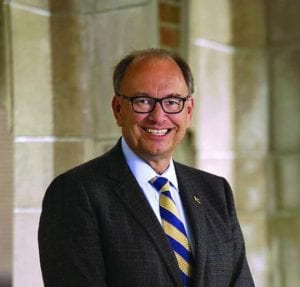
Steve Bahls has been Augustana College president since 2003.
In late January, Augustana College president Steven Bahls announced he was delaying his planned retirement one year – from July 2021 to July 1, 2022. In early February, St. Ambrose University concluded its search process for the 14th president of the Davenport institution, naming Amy C. Novak, president of Dakota Wesleyan University in Mitchell, S.D., to take the helm this August, with the retirement of Sister Joan Lescinski.
And in late February, Augustana in Rock Island held several listening sessions with key constituencies of the campus and wider community, to help draft a job description and get on the road to choose its ninth president by Jan. 1, 2022.
Bahls, 66, delayed his retirement in order to lead the college through the challenging years of the pandemic.
“It has been the highlight of my professional life to serve Augustana College, and I look forward to my next great adventure,” he said in his Jan. 25 announcement.
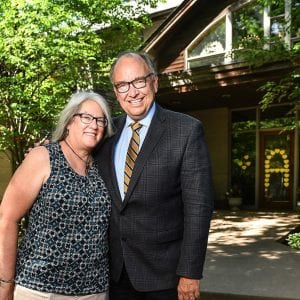
Steve Bahls, 66, with his wife Jane, who both have been very involved in the Q-C community.
Bahls started his tenure at Augustana in the summer of 2003. Previously, he was dean at Capital University Law School (Columbus, Ohio), the only law school in the nation affiliated with the Evangelical Lutheran Church in America, and served as associate dean and professor at the University of Montana School of Law.
“Steve’s leadership has driven Augustana to new heights, and he’s done that with a steadfast commitment to growth, to innovative programming, to diversity and to the long-term financial strength of the college,” said John Murabito (class of 1980), chairman of Augie’s Board of Trustees and its 13-member presidential search committee.
That panel includes:
- Wiley Adams ’82, trustee
- Barbara Lundblad ’66, trustee
- Michael Gapen ’91, trustee
- Gail Richard ’76, trustee
- Lee Selander ’72, trustee
- Diane Hill ’66, trustee
- Doug Parvin, faculty
- Megan Havard-Rockwell, faculty
- Mariano Magalhães, faculty
- Liz Nino, administrator
- Kelly Bethke, coach, faculty
- Lauren Hall ’22, student
The search committee is partnering with professionals from Academic Search, a Washington, D.C.-based firm that specializes in leadership-level search for colleges. They will assist with the national search for highly qualified candidates to serve as president.
Augustana’s team from Academic Search includes two former college presidents: Jay Lemons, president and senior consultant, and Sharon Herzberger, senior consultant; and Jennifer Kooken, consultant.
“The board felt and Steve felt delaying his retirement so we got through what was likely to be a challenging time, with his leadership in place, that made sense,” Murabito said Thursday. “Every college has had challenges through this Covid situation, but from what I can tell, Augustana has handled the situation exceedingly well with the leadership of Steve, the cabinet and the faculty as well.”
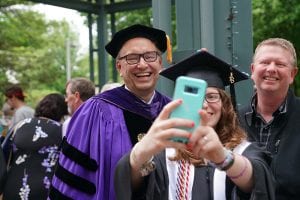
Bahls takes a selfie with an Augustana student at commencement.
The board wanted an early start on the presidential search process, to name the next person by Jan. 1, 2022.
“Getting a really good start on understanding the perspectives of all the stakeholders around the role, would give us a great opportunity to do that,” he said. “It also we think puts us in a position, getting an early start, to have an early end.”
That would allow for a significant, smooth transition, with the next president working with Bahls over those six months, Murabito said.
There were several listening sessions held last month, with different groups on Zoom – including the Augustana board, Q-C community leaders, alumni leaders, students, the college cabinet, administration and faculty.
The feedback will help the search committee compile a job description (what Murabito called “a leadership profile”) for the search.
“We’re about to recruit and select only the ninth president of Augustana. We feel like it’s critically important we make a great choice,” he said. “Steve Bahls has been a wonderful president at Augustana; big shoes to fill. But we also have to make sure we’re conscious of the challenges of the future. We wanted to make sure we were really thorough in these listening sessions to understand what people felt like was going to be key to success over the next 5, 10, 20 years.”
They’re critical in crafting a leadership profile used in recruitment, describing what they need in the next president. That will be done by the search consultant in the next six weeks, Murabito said.
Who should the new president be?
It’s very hard to choose one person who will represent all the needs and aspirations of the community, the board chair said.
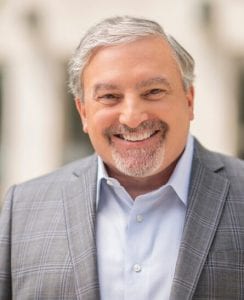
John Murabito is chairman of Augustana’s Board of Trustees and its presidential search committee.
“A job like this requires so many different things. The task of the search committee and search consultant is that we have so many different challenges, and capabilities we’re trying to fill,” he said. “What are things that are most necessary in our next president? How is he or she prepared to understand and deliver on the challenges we know are coming?
“We’ll have to make choices and probably tradeoffs,” Murabito said. “I doubt there’s a person alive that has every single base covered. You could probably say the same thing for any big job in any big organization.”
Personally, he would like a president who’s a strategic thinker, conscious of challenges in higher education; open to new and diverse ideas and has demonstrated creative and innovative approaches.
Murabito also wants someone appreciative of the liberal arts, but also recognizes the importance of vocational disciplines (like accounting, sciences and engineering); engaged in the Q-C community; someone with financial acumen and cultural competency.
“Someone who understands various cultures, as well as international, is really critical,” he said. “The last thing I would say in my mind is faith and a spiritual orientation, I think is important given the background of our school.”
One of the Frequently Asked Questions about the search on the college website asks, “Will there be an expectation that the next president is

Murabito graduated from Augustana in 1980 and is chief human resources officer for health services giant Cigna.
Lutheran?”
The answer: The Constitution of the College is our governing document, and its preamble roots us in our Lutheran tradition. It also articulates that “the president of the College shall demonstrate a firm commitment to advancing the welcoming Lutheran tradition of higher education as expressed in the College’s mission statement and Five Faith Commitments.
Eight white men have been president of Augustana since its founding in 1860. The first was Rev. Lars Paul Esbjörn, who, having previously served as chair of Scandinavian language and literature at the young Illinois State University in Springfield, opened the Augustana Seminary in a small frame building in Chicago on Sept. 1, 1860.
Given that Amy Novak is the second woman to lead St. Ambrose University since 2007, and increasing national emphasis on college diversity, equity and inclusion, should Augie’s next leader be a woman or minority?
“Diversity has been really important to Augustana, particularly in the timeframe Steve has been president,” Murabito said Thursday. Numbers of minorities and international students have risen dramatically in the last two decades.
“It’s really important that we have the opportunity to seek candidates for president that are women or minorities,” he said. “It’s definitely a priority in terms of the search process and pool of candidates.”
Just 30.1 percent of U.S. college and university presidencies were held by women in 2016 — up from 23 percent in 2006, and 21.1 percent in
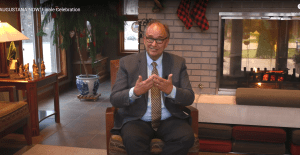
Steve Bahls at his home in Rock Island.
2001, according to a 2017 piece at insidehighered.com.
Women are a majority of all undergraduates in the U.S., and the number of minority students is projected to grow considerably in the future, the site said. Yet less than a third of college presidents were women in 2016, and less than 20 percent were members of a racial or ethnic minority group.
At Augustana (with about 2,400 students), the number of non-Hispanic white students has been declining since 2015, from 75.7 percent of enrollment to 66 percent in fall 2019. The portion of the student body that’s female is consistently 56 to 58 percent, and number of international students has risen from less than 1 percent in 2012 to 12 percent in 2019.
Three years ago, Augie hired its first vice president of diversity and inclusion, Monica Smith. Over the previous 10 years, the number of

On New Year’s Eve, Augustana celebrated raising $133 million, exceeding its $125-million campaign goal.
enrolled students of color at Augustana increased from roughly 200 to nearly 600, and in 2018 the number of international students grew to 195.
“After significant progress in growing the number of students of color and developing many campus initiatives to support diversity, the hire of Dr. Smith reinforces Augustana’s commitment to creating an inclusive environment for all students,” the college said then.
According to Augie, the president’s job will be promoted widely with “special attention paid to attracting candidates with a broad range of academic and nontraditional experience, as well as candidates from diverse racial, ethnic, gender, and other backgrounds.”
The FAQs also noted that Academic Search is known for its “impressive record of placing people from under-represented populations in leadership positions, to assist the Search Committee. The search will use best practices for diversity, equity, and inclusion throughout the search process, and the Search Committee will engage in training to guard against bias.”
SAU search process
St. Ambrose began its search process less than a year before Joan Lescinski planned to retire, this August, after 14 years as president. She announced her retirement in late August 2020.
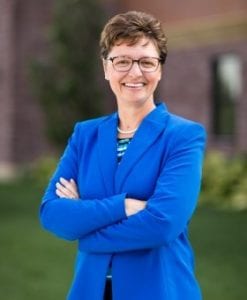
Amy C. Novak, 49, will become 14th president of St. Ambrose University this summer.
Amy C. Novak, president of Dakota Wesleyan University in Mitchell, S.D., will become the 14th president of SAU. She was chosen last month by the SAU Board of Trustees following a national search.
A 49-year-old native South Dakotan, Novak has served as president of Dakota Wesleyan University since April 2013. She will become just the second female president in SAU’s 139-year-history.
The success during Novak’s tenure led to DWU being profiled – along with a handful of other U.S. colleges and universities – in the 2019 book Pivot: A Vision for the New University.
“I am deeply appreciative of Sr. Joan, Dr. Edward Rogalski, her predecessor, and, indeed, of all the previous leaders of St. Ambrose,” Novak said in a university release. “St. Ambrose is a strong and vital institution because of their tireless work, and we are all fortunate to be the beneficiaries of their leadership and vision. I am also grateful to all of the members of the St. Ambrose community – students, faculty, staff, coaches, and leadership team members – who took the time to answer my many questions during the search process.
“I am honored and humbled by this choice, and very excited to be part of the Ambrose community,” she said. “I look forward to continuing to find ways to co-develop a strong future for the university and the many communities it serves.”
Novak was picked following a nationwide search initiated by the Most Rev. Thomas Zinkula, bishop of the Diocese of Davenport and chair of the St. Ambrose Board of Trustees. SAU trustee alumni John Anderson (’87) and Renee Citera (’81) co-chaired the search committee.
The search was launched with the assistance of national search firm WittKieffer shortly after Lescinski’s August 2020 announcement of her intention to retire from a nearly 50-year career in service to Catholic higher education.
“Dr. Amy Novak brings proven presidential leadership to St. Ambrose University,” Bishop Zinkula said. “Innovative, articulate, energetic, and compassionate, Amy clearly has the requisite personal gifts and professional experience to shape the future of the university in a
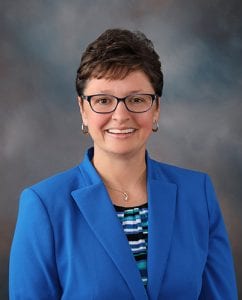
Novak has been president of Dakota Wesleyan University in South Dakota since 2013.
substantial manner.”
The next Augie president will have a chance to work cooperatively with Novak at Ambrose, both newcomers, Murabito said.
“When you have two fine schools across the river from each other, it would actually be kind of a shame if the two presidents did not have a relationship and learn from each other,” he said. “I think Steve has done that with the current president at St. Ambrose and that should happen in the future.
“That doesn’t imply specific partnerships, but the ability to learn and understand from one another is important,” Murabito said.
With only eight presidents serving over Augie’s 161-year history, that averages 20 years per person; Bahls will have served 19 years at his retirement.
“It says that the president of Augustana College is a distinguished role,” Murabito said. “It’s a role that people are attracted to for a significant amount of time. It says that for many individuals over that timeframe, it’s been a calling to be the president of Augustana. It’s a destination job for someone in education. It means there’s a dedication to an obviously strong culture and an opportunity to make a difference for so many.”
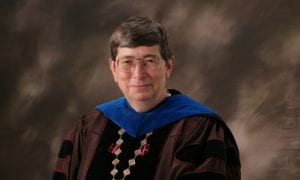
Sister Joan Lescinski will retire in August after 14 years as St. Ambrose president.
There’s also an online survey the college is offering now, to help inform the leadership profile by May 1, he said. The committee plans to get applicants through the fall, when they will do interviews and make decisions for finalists.
Bahls’ legacy at Augustana
Steve Bahls joined the college in the summer of 2003 and was installed as president in October of that year. Among the major developments on campus since then:
- Faculty, staff and students worked together on two strategic plans — first Authentically Augustana: A Strategic Plan for a Premier Liberal Arts Collegeand now Augustana 2020: Our Path Forward.
- Major campus improvements have included the building of Duane R. Swanson Commons; the Dorothy Parkander Residence Center, the Murry and Cindy Gerber Center for Student Life, John and Mary Thorson-Lucken Field, the Austin E. Knowlton Outdoor Athletic Complex, and the Kim and Donna Brunner Theatre Center. In addition, substantial renovations have been completed to Old Main, Emmy Evald Hall and the Thomas Tredway Library.
- Augie Choice, a unique grant providing all students up to $2,000 to work with faculty mentors on research projects, pursue international study or engage in an internship, was introduced.
- More than half (54 percent) of students now have a meaningful international experience by the time of their graduation.
- Approximately one-third of Augustana students are either U.S.-born persons of color or international students, representing the most diverse student body in the college’s history.
- New programs have been added in Africana studies, creative writing, engineering physics, ethics, graphic design, international business, journalism, music composition, neuroscience, and data analytics; faculty leaders have launched the Augustana Center for Polar Studies, the Upper Mississippi Studies Center, and the Presidential Center for Faith and Learning.
- Women’s and men’s lacrosse, men’s volleyball, and women’s bowling have all been added to the college’s NCAA Division III athletic program, and Augustana has maintained its ranking as a leading producer of Academic All-Americans.
- A conversation led by Campus Ministries resulted in the Five Faith Commitments of Augustana College, an expression of what it means to be a church-related college in the 21st century.
- The college has raised more than $152 million as part of a comprehensive campaign, enabling Augustana to provide additional funds for scholarships, programming and enhancing buildings.
- Augustana’s enrollment has grown by almost 10 percent, and the faculty has grown by more than 13 percent.

Steve Bahls at his home in Rock Island.
Bahls also has been a dedicated Quad Citizen as well, serving as board chair of the Genesis Health Systems and the Quad Cities Chamber Foundation.
He previously chaired the boards of the Quad Cities Cultural Trust, Putnam Museum, the Illinois Quad City Chamber of Commerce and the Illowa Council of the Boy Scouts of America and also serves on the board of the Quad City Symphony. He was one of the three original tri-chairs of Q2030, the Quad-Cities’ regional action plan.
Bahls’s reach expanded beyond the Q-C, chairing the boards of the Federation of Illinois Independent Colleges and Universities, the CCIW Council of Presidents, the Lutheran Education Conference of North America, and the ELCA Council of Colleges and University Presidents.
While the search committee is committed to keeping the Augustana community informed about the search process and its progress, in order to attract the highest quality candidates, the process will be highly confidential. Names of candidates will not be made publicly available during the process.
Committee members have committed to maintaining the confidentiality and integrity of the process and will not be able comment publicly on the search.
According to Augie’s FAQs, a confidential search provides candidates the opportunity to explore and pursue the presidency of Augustana College without risk of compromising their current positions. It enables Augustana to attract the most talented, highly qualified candidates, most of whom we anticipate will hold key leadership positions at other institutions or organizations.
Nominations should be submitted to AugustanaPresident@academicsearch.org. For more information, including a video on Bahls’ reflections as president, visit https://augustana.edu/presidential-search.









